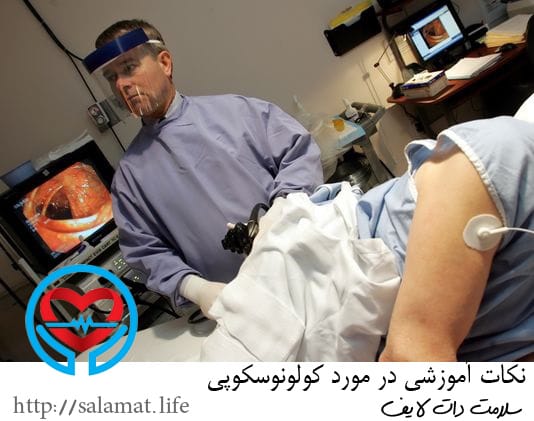What is Colonoscopy? The word colonoscopy consists of two Greek words colon and see. Colon cancer is one of the most common cancers among men and women and can also affect several people in the family. Colonoscopy is a common method that allows the physician to diagnose and treat benign diseases as well as colorectal cancer at an early stage. In this article’s tutorial on colonoscopy, we will explain in detail how to prepare for colonoscopy.
Colon cancer is usually first seen as an enlargement called a polyp that hangs inside the colon. Not all polyps are cancerous, but they should be monitored well. Colon cancer is characterized by symptoms in the stool (black or very dark stool) and changes in excretory habits. Colonoscopy is also used to diagnose other diseases of the colon, such as infections or chronic inflammation of the colon. These diseases can become colon cancer. This tutorial will tell you the procedure, benefits, risks and possible side effects of colonoscopy.
Colonoscopy and useful information about colon cancer

What is a colonoscope?
It is flexible in the form of a tube and enters your rectum through the anus. The tube has a light source that transmits images from inside the colon onto the screen and allows the physician to view the inside of the colon clearly.
Where’s the colon ?
The colon is the last part of the gut, also called the colon. The fiber and food ingested reach the colon after passing through the esophagus, stomach, and small intestine. In the large intestine, water, minerals and other nutrients are absorbed and the stool is stored at the bottom of the intestine before disposal.
Colonoscopic Uses :
Colon Observation to Detect Causes of Severe Bloating, Infection, Colonic Wounds, Abdominal Pain, Constipation or Untreated Diarrhea
Diagnosis and treatment of intestinal bleeding
Relieve stenosis caused by tumors and colon ulcers
Diagnosis and biopsy of colon and colon tumors
Removal of polyps and benign colon masses
Checkups in people with a family history of bowel disease under 50 years
Routine screening for colon cancer in people over the age of 50
Pre-colonoscopy procedures:
Visit by a gastroenterologist and receive a colonoscopy prescription
Coordinate with the endoscopy unit secretary to schedule an appointment by phone or in person
Including all documents including insurance booklet and colonoscopy prescription
The patient should be accompanied by a patient on a colonoscopy day. Tell your doctor if you are taking any medication and tell your doctor about the anti-glucose drug (pill or insulin), aspirin, plavix or svix and blood thinning drugs the day before colonoscopy. Was.
Pre-colonoscopy preparation (colonoscopy preparation method):
For colonoscopy, the colon should be very clean. You will need to follow the instructions of your doctor and nurse to clear your bowel from the stool.
The starting time for the powder packages your doctor prescribes is two days before the colonoscopy.
These commands start two days ago and include:
To cleanse the bowel from the stool, from 48 hour before colonoscopy, the patient should eat only fluids, such as water, tea, fruit juice, fully soup, chicken or broth, compote juice, fruit juice and jelly, from morning to night, Be it. Avoid carrot juice, milk, yogurt, soda and red liquor the day before colonoscopy.
Day 1: Eat a glass of castor oil at 4pm or some doctors suggest dissolving two packets of powder with 8 glasses of water (2 liters of water) and then gradually overnight.
Day 2 (the day before colonoscopy): In the morning, take a jar of castor oil or dissolve three packets of powder with 12 glasses of water (3 liters of water) and drink half a hour to one glass and 2 tablets of bisacodyl every 8 hours. do.
(Bisacodyl suppository or similar drug may be prescribed instead of tablets if prescribed by your doctor).
If necessary and at the discretion of your doctor, you may be hospitalized the day before and have
Patients should refrain from consuming any soup, juice, tea and juice for at least 6 hour before colonoscopy, and then fast to the clinic and then to the clinic in the morning.
Patients with heart failure, cardiac arrest, dialysis, diabetes (diabetes) or kidney failure should consult their physician about the amount of fluid intake in these two days.
Your doctor may sometimes prescribe alternatives or lesser medications to clean the bowel.
During colonoscopy :
Distinguished Patients Pay attention to your nurse and doctor’s training during colonoscopy.
You will be asked to wear a special dress.
Transfer to the colonoscope with the help of a bed.
You will be given a vein (vein) to give you a route to administer your serum and, if needed, a sleep medication.
Sleep in the front of the bed to your left and fold your knees.
You have to lie to the left.
Colonoscopy is usually not painful, but you may experience some discomfort.
During the test, medications are injected into your vein by the anesthesiologist to relieve and relieve the pain.
When the flexible tube enters through the anus, you may feel it is normal. But if you feel pressured to tell your anesthesiologist, he or she can inject you with medication.
If your gastroenterologist finds a suspicious area, he may remove one or all of it and send it to the lab. A pathologist examines the tissue under a microscope to detect possible diseases.
After the procedure is completed, the gastroenterologist will remove the observation device and the anesthesiologist will alert you.
Colonoscopy is a very safe method that can save lives. But it may have risks, but the benefits are greater for you.
Sometimes the colon is not completely cleaned. In this case, the colonoscopy may not be done and your work will be postponed to another day, so be careful before preparing for the colonoscopy.
If you have a biopsy, some blood may come out of the anus, usually not bleeding.
After colonoscopy :
You can go home the same day, but you will need it.
In anesthesiologists who choose to have an anesthesia colonoscopy with your choice or your physician, you should rest at the colonoscopy clinic a few minutes after the end of the colonoscopy and until awakening, and you can leave the hospital only with the permission of the appropriate department. .
If you have a biopsy, you should show your doctor the result of the test to continue treatment. Some patients may require a repeat colonoscopy at intervals of one year to make sure no new problems arise.
Do we need hospitalization after colonoscopy?
This is an outpatient procedure. This means you will go home after the colonoscopy.
See your doctor after discharge from the colonoscopy unit if you have the following symptoms:
If you have severe abdominal pain, vomiting, stools for more than one day, stools with clear blood, shortness of breath, flatulence associated with severe abdominal distention, contact an endoscopic-colonoscopy unit or see a hospital emergency department.
Avoid driving for up to 6 hours if you are anesthetized.
Patients may have mild bloating or mild heartburn for up to 24 hours and it is quite normal.
After colonoscopy, it is best not to eat up to 24 hours of nonfat food such as legumes and vegetables.



 روز شنبه 29 آذر ماه مطب تعطیل است
روز شنبه 29 آذر ماه مطب تعطیل است